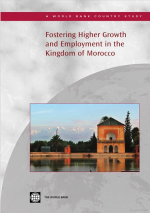Citation:

Abstract:
This book identifies the binding constraints to growth of Morocco. It applies an innovative procedure known as 'growth diagnostic' and has a central finding. The Moroccan economy suffers from a too slow process of structural transformation for achieving higher growth, especially for its exports that face unfavorable external shocks arising from competitor countries in the main markets for Moroccan exports. This process of so-called 'productive diversification' requires that Morocco enhance its competitiveness. Four government failures are identified as the binding constraints to growth in Morocco: a rigid labor market; a taxation regime that represents a heavy burden for firms and an obstacle to hiring skilled human capital; a fixed exchange rate regime that has allowed regaining price stability, but, given existing rigidities in the labor market, does not favor international competitiveness; and an anti-export bias, featuring a still high level of trade protectionism despite recent progress in tariff reductions and the signing of several Free Trade Agreements. In parallel, three market failures affect competitiveness and innovation: information failures, coordination failures between the public and private sector, and training failures that rank the country among those with the lowest level of training offered by businesses.